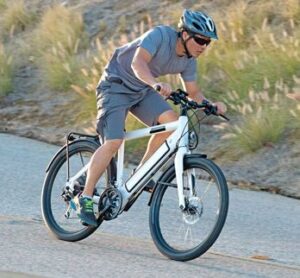With urban mobility evolving and sustainability becoming a top priority, choosing the right mode of transportation is more crucial than ever. For many commuters, the debate comes down to one key decision: E-Bike vs Traditional Bike. Both options offer excellent health, environmental, and financial benefits, but depending on your lifestyle and commute, one may suit you better than the other.
In this comprehensive guide, we break down the pros and cons of e-bikes and traditional bicycles to help you make the right choice for your daily commute.
What is an E-Bike?
An electric bicycle, or e-bike, is a bike equipped with a battery-powered electric motor that assists with pedaling. It doesn’t replace the act of pedaling entirely but offers a power boost, making riding easier and faster, especially over long distances or hilly terrain.
Key Differences: E-Bike vs Traditional Bike
| Feature | E-Bike | Traditional Bike |
|---|---|---|
| Power Source | Pedal + Electric Assist | Human Pedal Power Only |
| Speed | Up to 25-28 km/h with assist | Average 15-20 km/h |
| Cost | Higher upfront & maintenance costs | More affordable overall |
| Weight | Heavier due to battery/motor | Lightweight |
| Maintenance | Requires battery and motor servicing | Simpler maintenance |
| Fitness Level Required | Moderate | Higher |
Advantages of E-Bikes for Commuting
1. Faster Commute Times
E-bikes can significantly reduce your commuting time. With electric assist, you can maintain a higher average speed without overexerting yourself, especially useful for long-distance or uphill commutes.
2. Less Physical Strain
Commuters who face long rides or health challenges can benefit from the reduced strain on muscles and joints. E-bikes make cycling more inclusive.
3. Eco-Friendly Alternative
Compared to cars or motorcycles, e-bikes have a minimal carbon footprint. They’re a greener alternative that supports eco-conscious commuting.
4. Cost-Efficient in the Long Run
While e-bikes have a higher upfront cost, they save money over time. No fuel, minimal insurance, and lower parking or congestion charges add up to big savings.

5. Commuter-Friendly Features
Most e-bikes are designed with commuting in mind: racks, fenders, integrated lights, and more to make your daily ride smoother and more convenient.
Advantages of Traditional Bikes for Commuting
1. Lower Cost
Traditional bikes are much more affordable to buy and maintain. No battery, motor, or electronics mean fewer things to go wrong.
2. Fitness and Health Benefits
If you’re looking to stay in shape, traditional bikes offer a more intense cardiovascular workout. It’s the perfect way to integrate exercise into your daily routine.
3. Lightweight and Simple
Traditional bikes are easier to carry, lift, and store, especially for apartment dwellers or those using public transit as part of their commute.
4. Minimal Maintenance
With fewer mechanical components, traditional bikes are generally easier and cheaper to repair and maintain.
5. Long-Lasting and Durable
A well-maintained traditional bike can last decades, making it a long-term investment in both health and convenience.
What to Consider When Choosing Between an E-Bike and Traditional Bike
1. Distance of Your Commute
- If your daily commute is under 5 miles, a traditional bike may be ideal.
- For distances over 10 miles or those involving hills, an e-bike will save time and energy.
2. Terrain and Elevation
Hilly routes and challenging terrain make e-bikes a more practical choice, while flat urban routes can easily be managed with a traditional bike.
3. Storage and Charging
E-bikes require secure storage and regular charging, while traditional bikes are easier to lock up and store with less worry.
4. Budget
- Traditional bikes are ideal for budget-conscious commuters.
- E-bikes have a higher initial cost but can pay off with time savings and lower car-related expenses.
5. Fitness Goals
If health and fitness are primary goals, traditional bikes offer more of a workout. However, e-bikes still provide exercise, especially in pedal-assist modes.
Are E-Bikes Worth the Investment?
E-bikes are a smart investment for those looking to reduce car usage, save time, and commute longer distances with less physical strain. They’re also perfect for older adults or individuals recovering from injuries who still want to stay active. While they cost more upfront, their convenience and efficiency often outweigh the price difference in the long run.
Who Should Stick to Traditional Bikes?
If your commute is short, your budget is limited, or you’re keen on maximizing fitness benefits, traditional bikes remain a fantastic option. They’re simple, eco-friendly, and require less maintenance.
Conclusion: Which Bike Wins the Commute?
Ultimately, the right bike depends on your personal needs, budget, and commuting habits. If speed, comfort, and less effort are top priorities, an e-bike is worth considering. If you prefer a budget-friendly, fitness-boosting, and low-maintenance solution, a traditional bike could be the way to go.
At Station Cycles, we offer both electric and traditional bikes to suit every type of commuter. Whether you’re upgrading your current ride or just starting your cycling journey, our expert team can help you choose the perfect bike for your lifestyle.
Ready to make your commute smarter, healthier, and greener? Visit www.stationbicycles.co.uk and explore our range of e-bikes and traditional bicycles today!